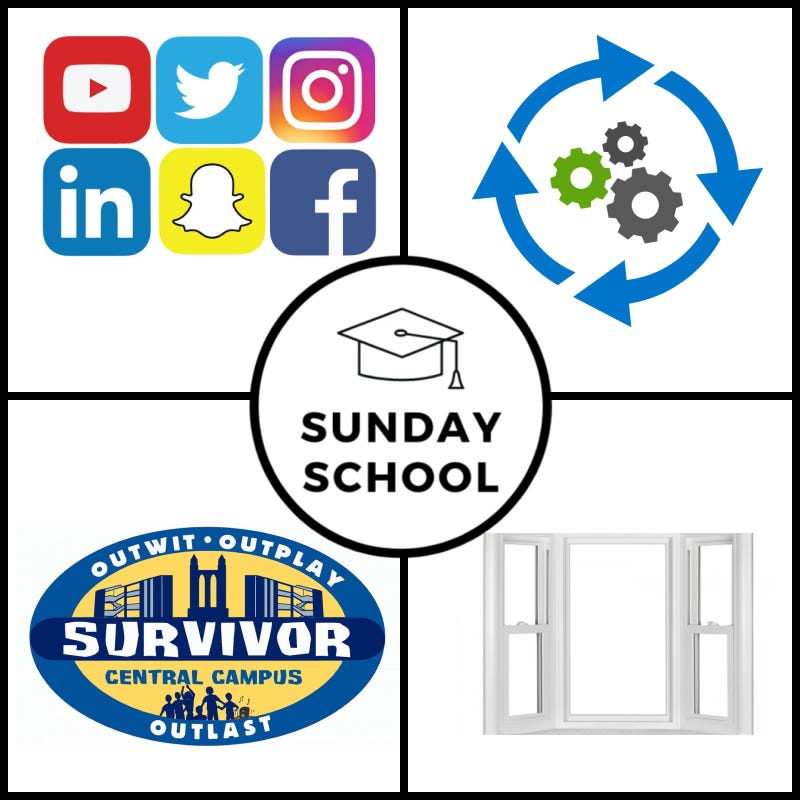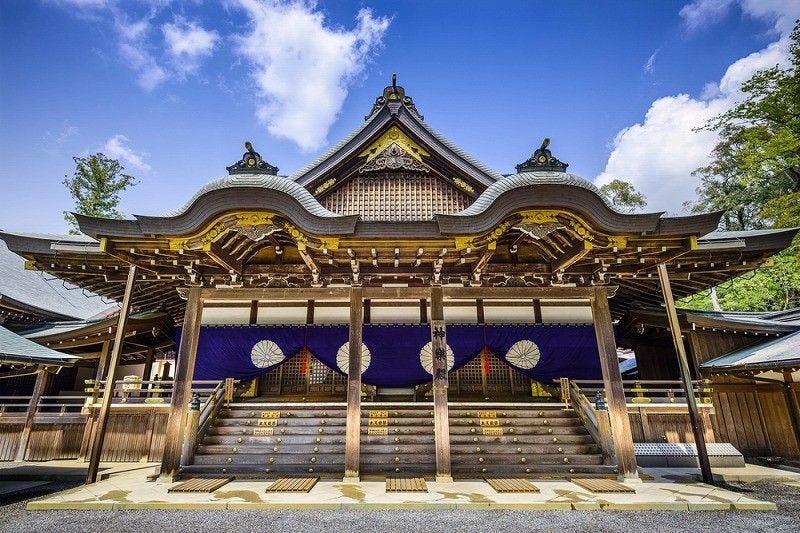Survivor: College Edition (7/26/20)
Hey friends!
Another week, another four lessons. Thanks for being here. If you’re reading this but haven’t subscribed, join Sunday School by clicking here!
Not to say this isn’t real school, but actual schools are trying to make plans for this fall and IT. IS. COMPLICATED.
I’ve talked to friends and family who work in education and everyone is trying to make the best out of the current circumstances, but this isn’t going to be ideal for anyone - students, teachers, and parents alike.
Aside from all of the obvious impacts of COVID, there are so many “hidden” impacts that come along with all of this. 2020 grads entering a depleted job market, school-age children are receiving unfocused/online lessons, incoming college freshmen are weighing gap years, and so many more. All of these things have impacts well beyond 2020. They’re life-altering.
Education, in one way or another, is going to be changed forever. Those that refuse to accept that will struggle to survive. More on this in a minute….
Let’s get to today’s lessons!

Homeroom
My Essay: Minimum Viable Creativity
It’s not easy to consistently create. Most people who are starting out with creating encounter a huge hurdle: perfectionism.
This essay is my mental model around this problem, designed to be a way of creating that leads to fewer perfectionist roadblocks and more publishing and improving.
I compare creativity with the idea of minimum viable product and explain how touching on several key elements of creation can establish a baseline that you’re ready to publish to keep improving.

If you struggle with any sort of perfectionism, check this out and let me know what you think!
Lessons in Social Media Hysteria
Essay: Jump - Michael Solana
We’re at a tipping point with social media. Facebook and Twitter are constantly in the news regarding ethics and filtration of the content that is allowed to circulate on their platforms. No matter which side of the political divide you fall on, you’re angry at the content that the other side shares. “Fake news” falls both ways.
I love this essay. It’s beautifully written and explains the most dangerous potential of social media, which is this:
“The greatest possible danger of social media is the catalyzation of mass, relatively instant global action on incomplete or incorrect information.”
Ideas and information on social media can scale to the point of a billion people all acting at exactly the same moment in a temporary state of madness. Scary stuff. Stack this on top of the fact that a billion people could simultaneously react to something that isn’t real? Terrifying.
We’re going to see government stepping in with social platforms in the coming years, but no government regulation is going to change the inherent dangers that come along with this idea. If social media exists, it will contain this potential. And it will always exist.
What can we do about this on a personal level? Here’s my opinion, and many will disagree:
Don’t get caught up in politics on social media. It’s a terrible platform for nuance, and politics carries a ton of nuance, as do many other topics on social media. Really think about content, research it before you share, and try and have more conversations in person than online. In-person conversations are much less likely to spiral into mannerless discourse and more likely to find points of mutual understanding.
Process Preservation

This is Ise Grand Shrine in Mie Prefecture, Japan. This shrine has been torn down and rebuilt every 20 years for the past 1,300 years.
Are you kidding me? Why would they do this?
It’s about preserving the process of how this amazing building was constructed. By tearing it down every 20 years, locals keep the historical aesthetics alive and prevent the wear and tear of age on the original architect’s design.
There’s an amazing lesson in here above and beyond the simple dedication of the people tasked with the rebuilds. I think it prompts the question:
What process is worthy of preserving in your life?
There are so many tasks that we do all the time that we rush through as they become more familiar. But as we refine processes the original vision can often be lost. Pay attention to the process and think about if it’s something worth recording. It might pay off at some point and preserve something really worth keeping.
Survivor: College Edition
Spreadsheet: Higher Education: Value vs. Vulnerability
Will your college survive COVID?
There’s no certain way to know at this point, but it would seem that ~40% of schools are in a vulnerable place. This spreadsheet lists out most U.S. schools and uses data points to categorize the future of all schools into these buckets: thrive, survive, struggle, and perish. Here’s a chart with only a few schools (view spreadsheet for all schools):

Take a look at the full spreadsheet and see where your school falls.
This all comes from a larger article by Scott Galloway, a professor at NYU. This article is worth a read if it’s a topic that interests you.
Geography Through Windows
Website: Window Swap
Finishing things out this week with a cool share instead of a lesson.
This is a cool project that’s been going around the internet this week. On Window Swap, you can check views from different people’s windows around the world. If you want, you can even submit yours.
There’s really nothing to it, but it’s cool to picture yourself in another country living out of a different window when we’re all mostly stuck with the windows we have for a while.
Quote of the Week
“How vain is it to sit down and write when you have not stood up to live?” -Henry David Thoreau
Photo of the Week

With slightly more free time during the 100% COVID work from home era, I’ve started surfing and am finally starting to get the hang of it.
That’s all for this week, thanks for attending!
If you appreciate Sunday School the best compliment you could give is to share with someone else who you think would appreciate it too. Click here to share:
See you all next week!
-Ryan


